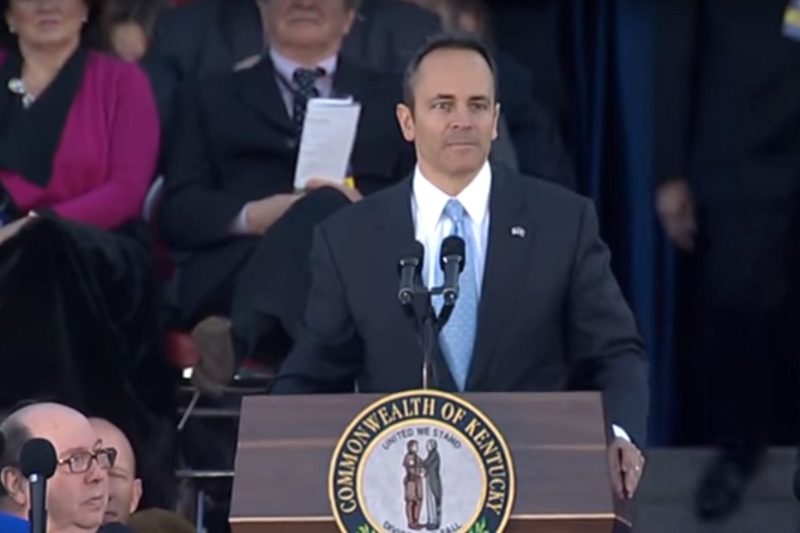Kentucky Democrats, Planned Parenthood Fight Two-Pronged Anti-Choice Effort (Updated)
Gov. Matt Bevin has vowed to shut down Planned Parenthood's new clinic, and Democrats have changed a bill that forces women to receive in-person consultation before accessing abortion care.

UPDATE, February 1, 6:25 p.m.: The state senate passed SB 4 with a vote of 33-5 Monday night, and it’s on its way to the governor’s desk.
Newly elected Kentucky Gov. Matt Bevin, an outspoken anti-choice Republican, vowed to shut down one of the state’s three abortion providers, claiming the clinic had violated the law despite approval from the former governor’s administration.
“According to KRS 216B.990, it is against Kentucky law for a facility to perform abortions without a license. This facility is not licensed and it is breaking the law,” Bevin said last week in a press statement.
The new Planned Parenthood clinic in downtown Louisville, Louisville Health Center, offers abortion care, making it the first of the organization’s Kentucky clinics to offer the procedure. Louisville has one other abortion provider, EMW Women’s Surgical Center, which has seen an increase in vandalism in recent months.
“We looked at the need in the Louisville area and concluded that our whole array of reproductive health services should include abortion services as well, and that will include surgical and nonsurgical,” Planned Parenthood of Indiana and Kentucky CEO Betty Cockrum told Insider Louisville.
Planned Parenthood of Indiana and Kentucky maintained that they were operating within the law. Officials from the organization told Insider Louisville that they “applied for an abortion facility license and commenced services under the guidance of the Office of the Inspector General, the state office that is responsible for licensing health facilities.”
Planned Parenthood released documents on Sunday that show Kentucky officials, under former Gov. Steve Beshear (D), authorized it to provide abortions at its Louisville clinic.
“We in no way, shape or form would contemplate offering abortion procedures in anything but a legal environment,” Cockrum said.
Stephen Pitt, general counsel for Bevin, dismissed this development, saying that while he is aware of the communications between Planned Parenthood and the Beshear administration, he believes the advice from the former Democratic governor was wrong and said Planned Parenthood should have contacted the Bevin administration before performing abortions while its license application was pending, according to the Courier-Journal.
Maryellen Mynear, the former inspector general with the Cabinet for Health and Family Services, said in an email correspondence with a Planned Parenthood lawyer that the clinic would need to start performing abortions before it could get a license, because the state would not issue a final license until a state inspector makes an unannounced visit to the facility and inspects it after it has opened for business.
Planned Parenthood filed the application November 19, after Bevin was elected but before he took office on December 8.
Planned Parenthood agreed to suspend abortion services while it attempted to resolve the dispute with the Bevin administration, Cockrum said. She did not rule out a court challenge.
“Certainly if we feel that we have no choice, we will pursue judicial relief,” she told the Courier-Journal. “I would like to avoid that.”
Abortion access has been under attack in the Kentucky legislature this year. A bill in the state’s GOP-dominated senate seeks to prohibit federal Title X family planning funds from passing though local health departments to Planned Parenthood clinics in Louisville and Lexington, the only cities in the state with abortion providers. Bevin’s new budget proposal calls for cutting off those funds.
Cockrum said that the Louisville Planned Parenthood clinic recently decided not to accept Title X funding, according to Insider Louisville.
“There’s a whole variety of reasons, but when we looked at the whole array of services and the budget projections about both sides of the ledger, we were able to conclude that it makes sense,” Cockrum told Insider Louisville. “There are reimbursement rate issues. So we are better able to more fully serve our patient base by not accepting Title X funding at that location.”
Meanwhile, house Democrats, who are trying to maintain their narrow majority, last week unveiled a new version of the state’s informed consent bill, SB 4.
Originally, SB 4 would have forced a person seeking an abortion to have a face-to-face medical consultation at least 24 hours before an abortion. This would prove a burden for many, as the only abortion clinics in the state are in Lexington and Louisville. The new version of the bill allows the patient to opt for a video chat in lieu of a face-to-face meeting.
The house voted 92-3 in favor of the updated bill and sent it back to the state senate, which could vote on the measure as early as Monday.
Derek Selznick, director of the American Civil Liberties Union of Kentucky Reproductive Freedom Project, is a leading critic of the bill.
“Senate Bill 4, despite language added in committee, remains an attempt by legislators to interfere with patients and the care they deserve from medical care providers, masquerading itself as a bill that helps Kentucky women,” Selznick said in a press statement. “While the inclusion of language embracing new technologies allowing patients easier and more convenient access to counseling is admirable, and an idea whose time has come, we remain strongly opposed to this legislation. Legislators were not elected to provide medical advice or care to Kentucky women and should have greater respect for the women and medical professionals they represent.”

